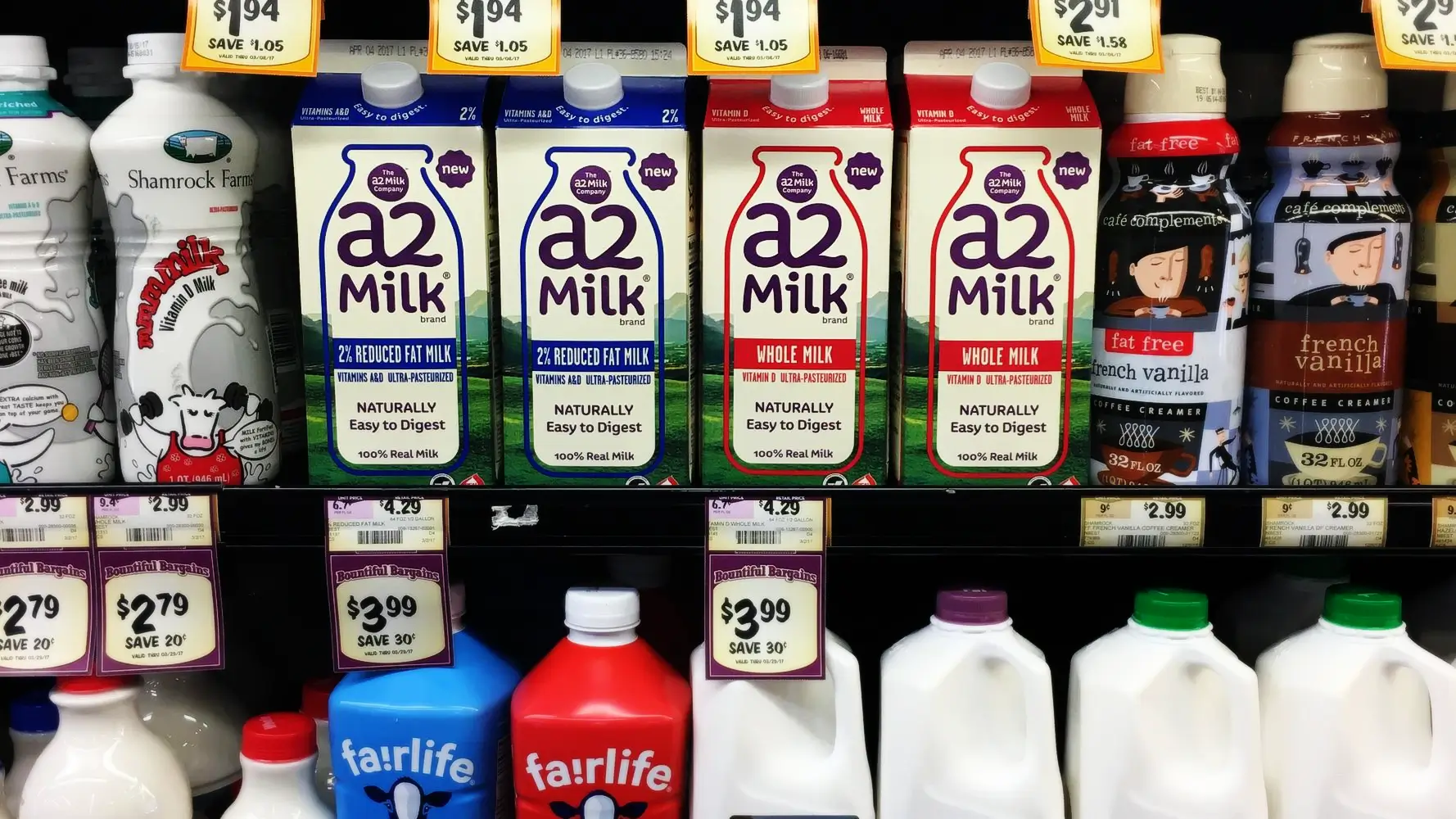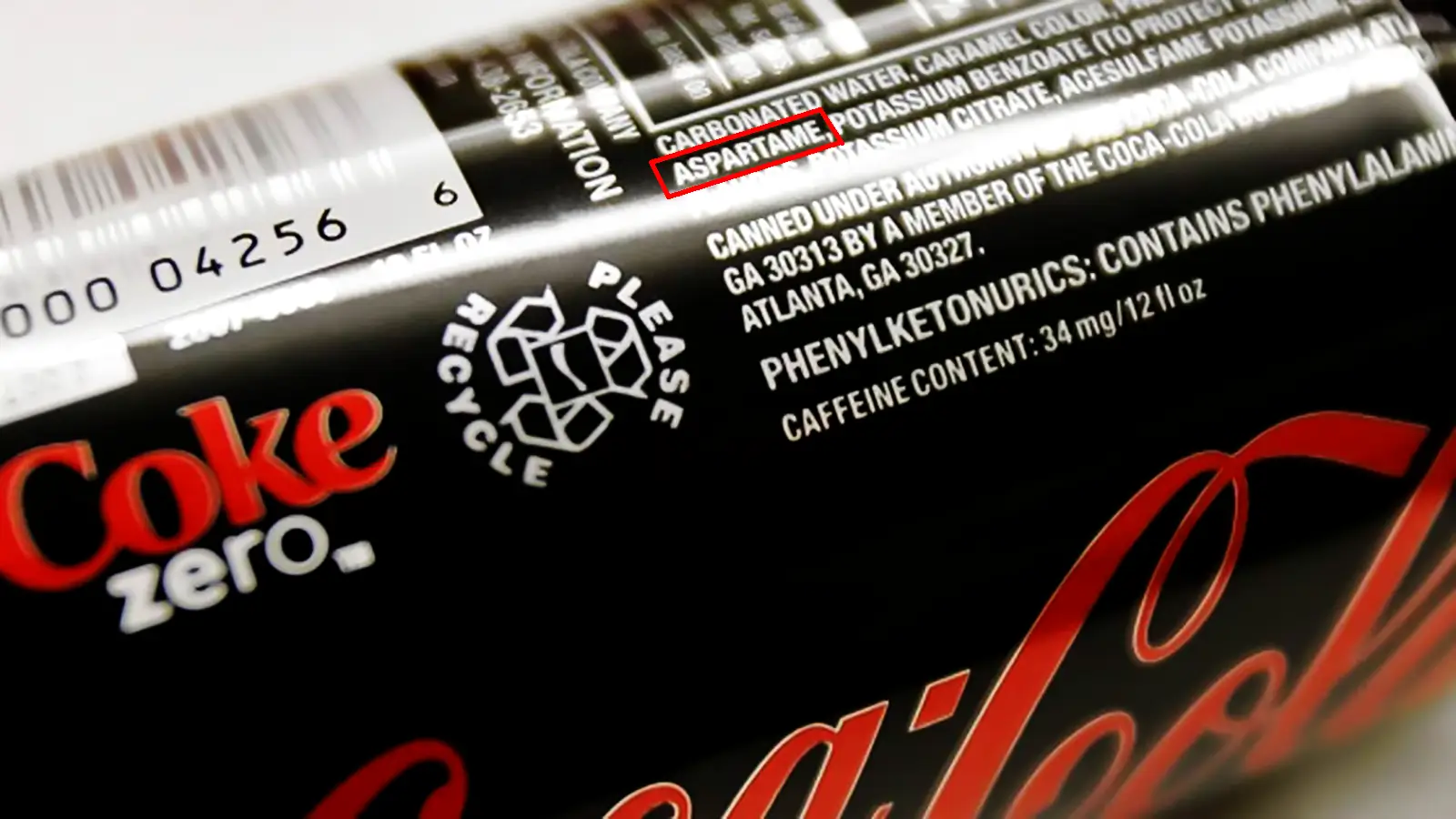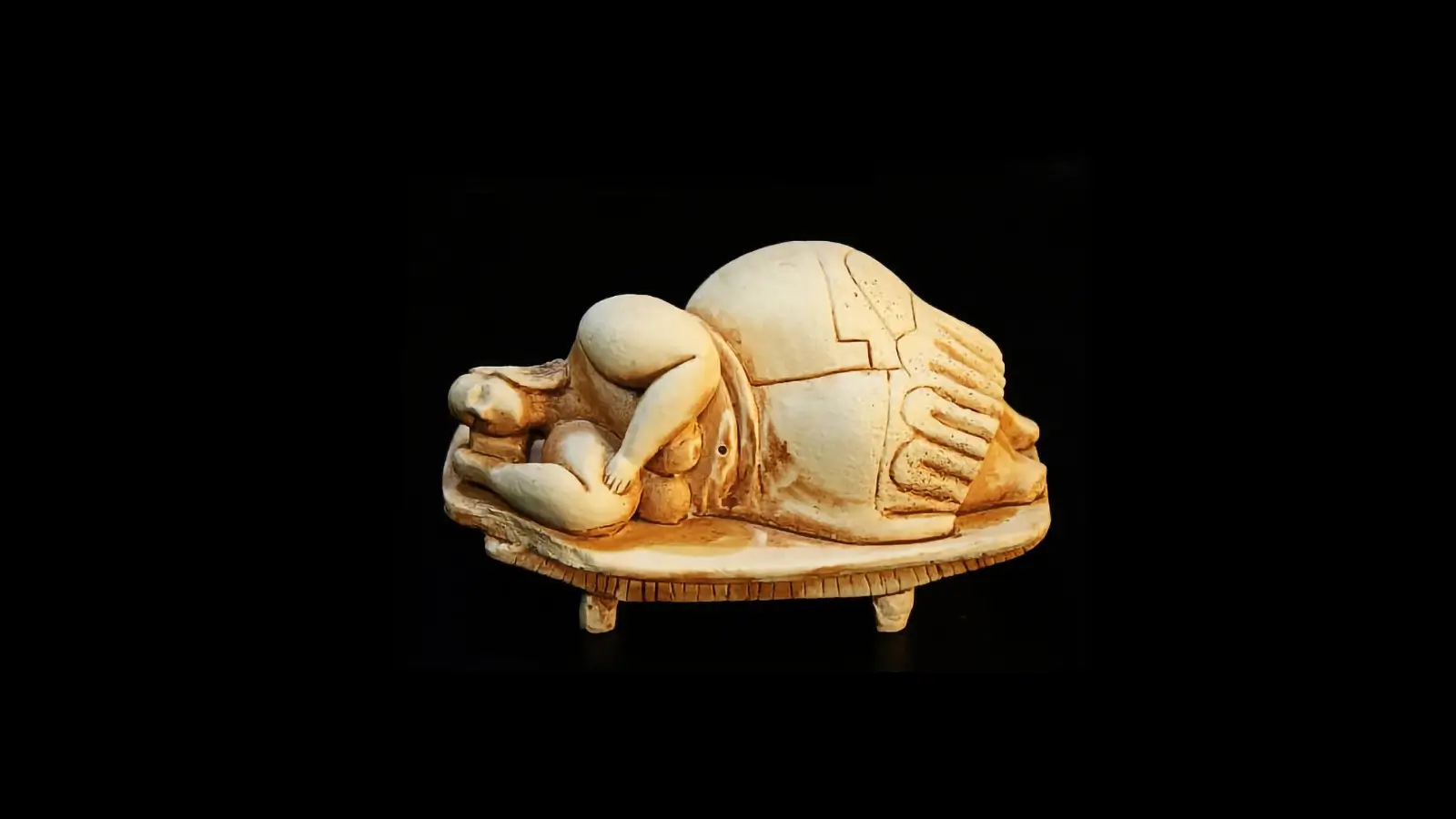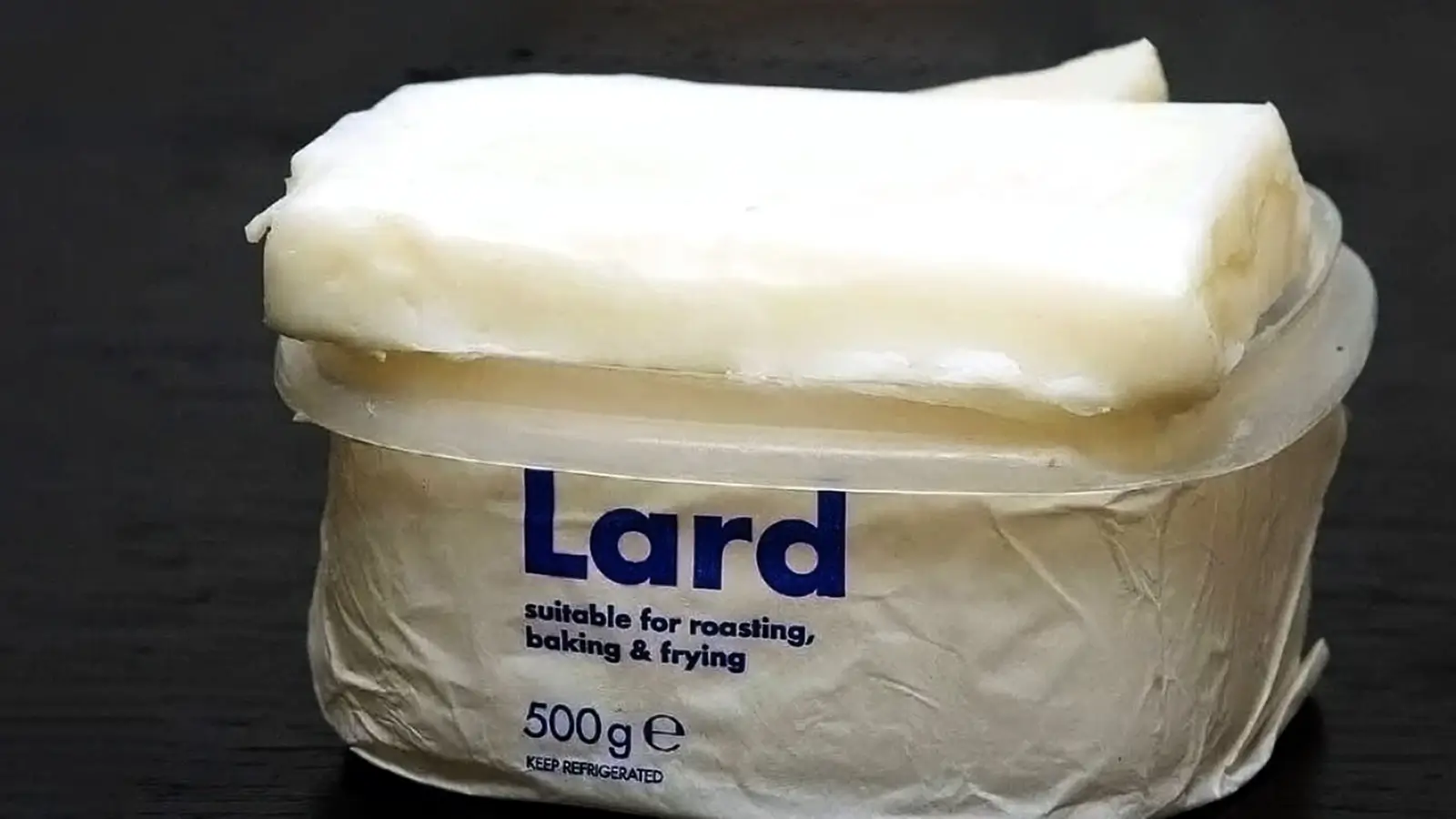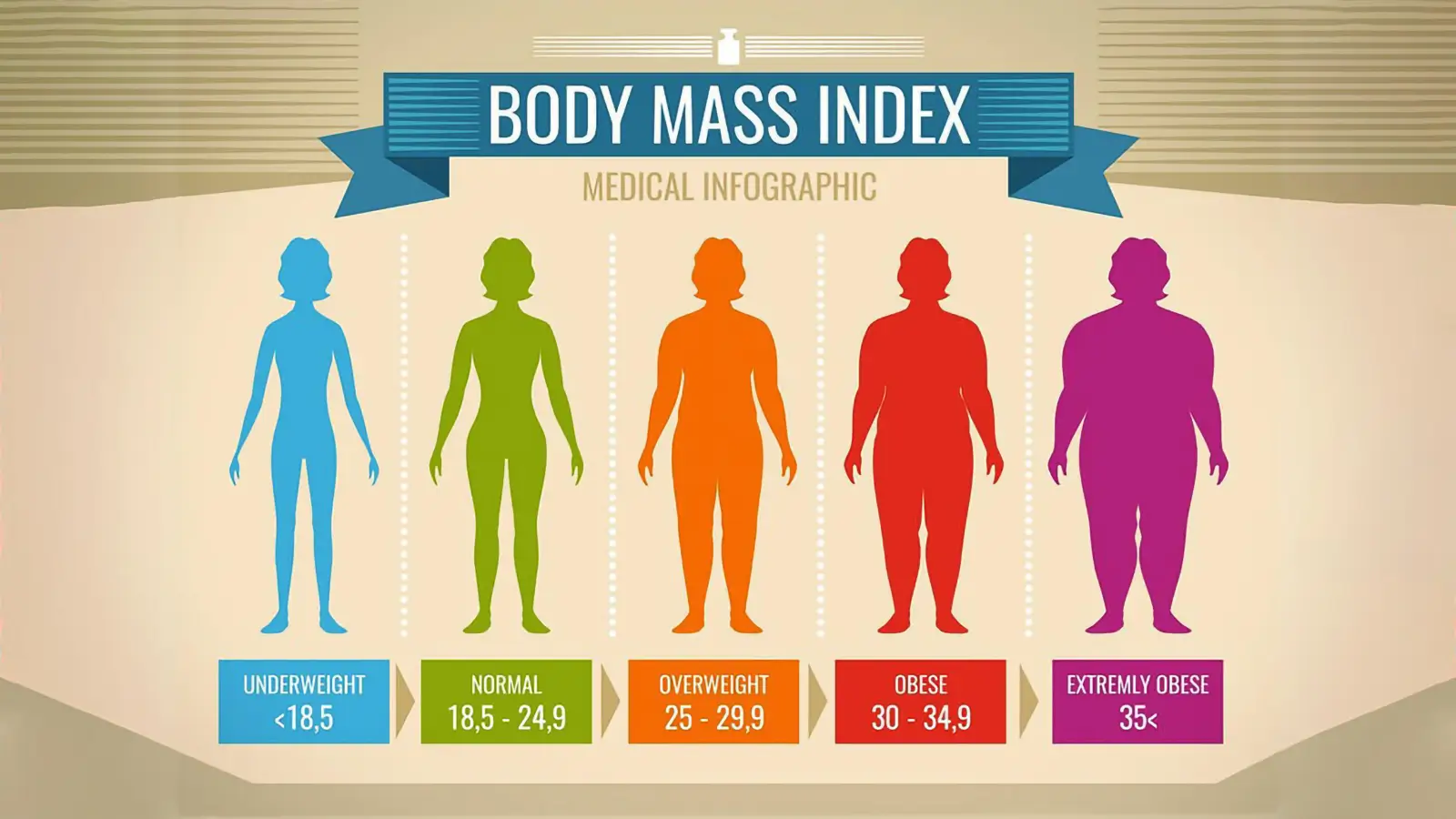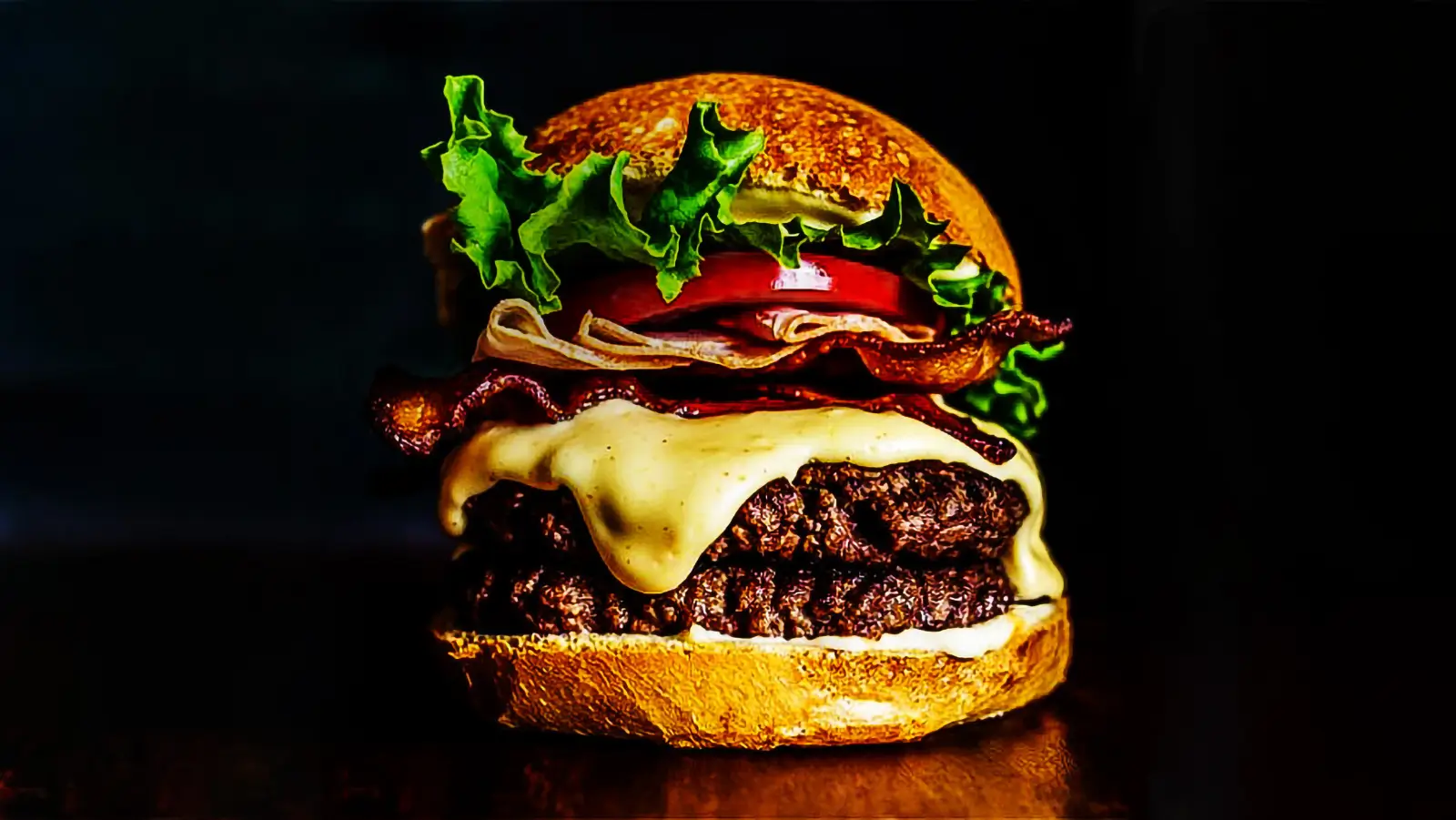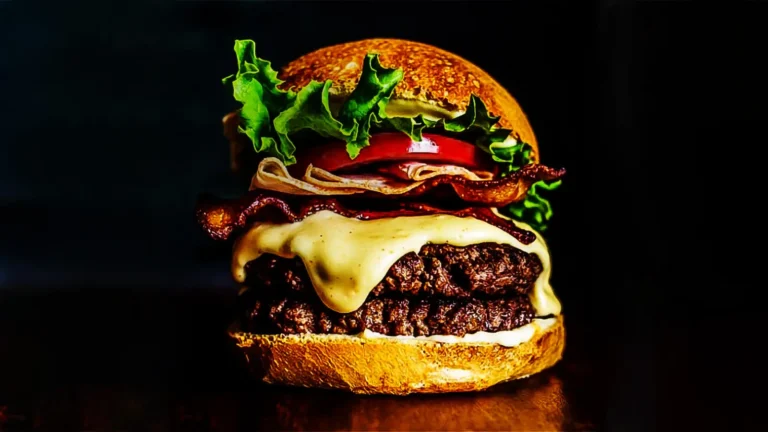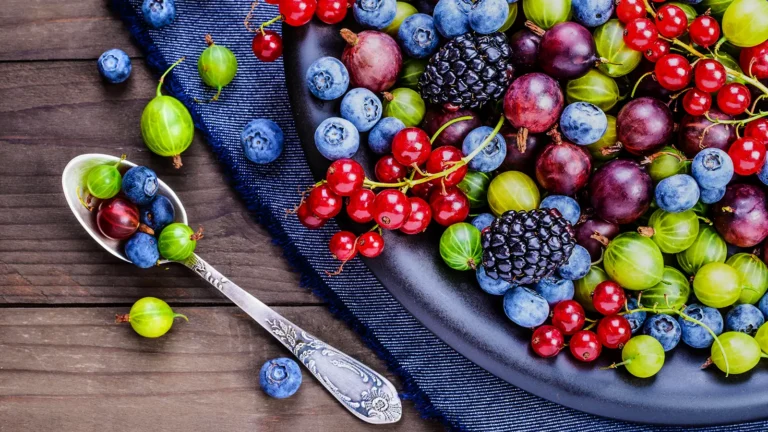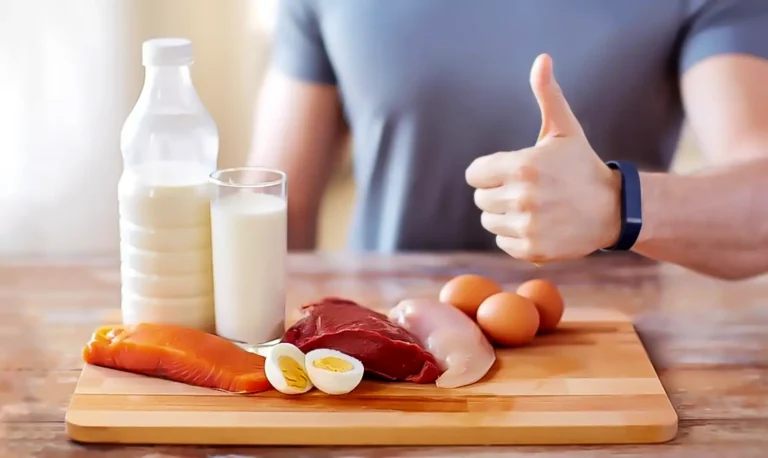Adoçantes artificiais - Compreender as noções básicas
Os edulcorantes artificiais são produtos químicos sintéticos não naturais e teremos de analisar a ciência disponível para compreender os potenciais efeitos que estes produtos químicos podem ter na saúde.
Milos Pokimica
Escrito por: Milos Pokimica
Revisto Clinicamente Por: Dr. Xiùying Wáng, M.D.
Actualizado em 28 de Maio, 2023A subida em flecha dos níveis de doenças crónicas, em especial da diabetes, levou a indústria a começar a investigar alternativas saudáveis ao açúcar, não só sob a forma de produtos amigos dos diabéticos, mas também para a população em geral. A concisão da saúde e a compreensão, por parte do público em geral, do que são alimentos pobres em nutrientes ou "comida de plástico" levaram a indústria não só a encontrar produtos químicos doces, mas também a encontrar produtos químicos sem calorias. Para a indústria, seria muito mais fácil encontrar alternativas ao açúcar sob a forma de substitutos do açúcar mais saudáveis e com calorias, mas não é isso que gera lucro. Na verdade, temos assistido a uma tendência completamente inversa, que consiste em adicionar cada vez mais frutose proveniente da produção de milho, que é barata, aos refrigerantes e a outros produtos. A situação atual é que cada indivíduo que quer optimizar a sua dieta mesmo que tenha diabetes, terá de o fazer por conta própria após ter examinado toda a informação e ciência e propaganda conflituosas. O problema é que todos sabemos que uma percentagem muito pequena de nós o fará de facto.
A situação atual é que o açúcar está em todo o lado, especialmente a frutose, e se quisermos algo que continue a ser doce e não tenha calorias, podemos usar adoçantes artificiais.
Os edulcorantes artificiais são produtos químicos e não são da natureza, pelo que temos de analisar a ciência disponível para compreender os potenciais efeitos para a saúde ou outros efeitos que estes produtos químicos possam ter.
O primeiro problema é que não são açúcar, por isso, mesmo que sejam doces, isso é apenas o sabor. O açúcar é mais do que apenas o sabor. É um neuroquímico libertador de dopamina que afecta todos os aspectos do nosso comportamento. Por exemplo, se tiver hipoglicémia e começar a tremer e se sentir enjoado, os adoçantes artificiais não farão nada por si.
Devido a estes adoçantes artificiais não têm o efeito desejado ao mesmo nível no cérebro se não forem excitotoxinas ao mesmo tempo. Para substituir verdadeiramente os efeitos neurológicos do açúcar, teremos de utilizar excitotoxinas que são doces.
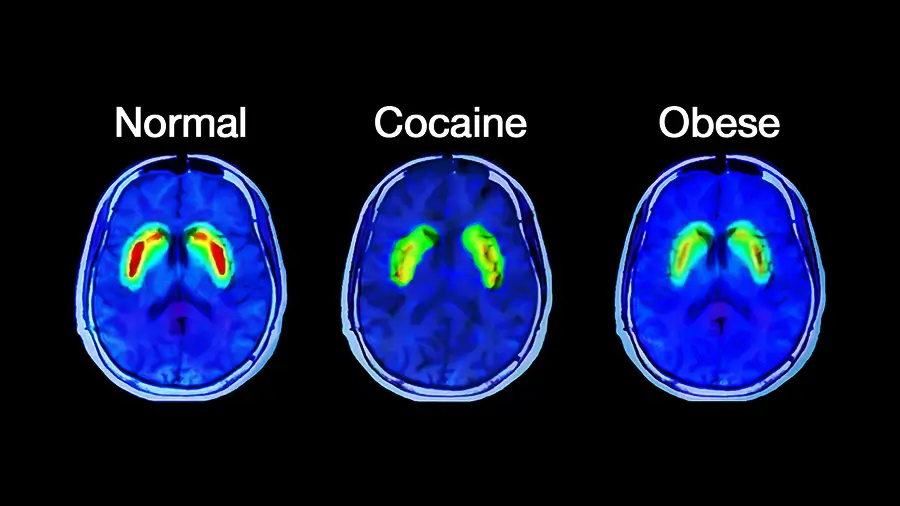
Stevia pode tornar as coisas doces mas não terá um efeito dopaminérgico no cérebro como o açúcar e especialmente a combinação açúcar-gordura, pelo que normalmente não seria satisfatório como chocolate ou gelado. Terá ainda um efeito de simulação, mas apenas por um curto período de tempo.
A indústria precisa de combinar açúcar e gordura ou utilizar produtos químicos excitotoxínicos para lhe dar uma sensação de saciedade total da dopamina. A combinação de açúcar e gordura e especialmente a combinação de açúcar e gordura refinada não existem na natureza, pelo que o nosso cérebro não está habituado a elas. Trata-se de algo conhecido como estímulos supernormais. Os edulcorantes artificiais precisam de ser produtos químicos libertadores de dopamina para simular completamente o açúcar refinado.

Esta é a razão, por exemplo, porque a Coca-Cola só usa aspartame (que é excitotoxina) no Coque Zero.
Os açúcares artificiais são bons para a indústria de outras formas. Podem comercializar os produtos como baixo ou zero calorias, saudáveis, dietéticos, etc., mas isso é o oposto do que acontece. A primeira coisa que acontece quando o nosso cérebro regista a sensação de doçura na nossa boca é a mesma coisa que aconteceu em milhões de anos de evolução, e que é dizer para o comer e gostar dele. O cérebro não sabe que essa coisa na nossa boca é um refrigerante dietético. Pensa que é alguma fruta doce e vai aumentar o seu apetite e dar-lhe desejo para que o possa comer rapidamente e enquanto ainda pode antes que algum tigre apareça. Agora há outro mecanismo que lhe dirá para parar de o comer antes de comer em excesso porque se comer em excesso, poderá não conseguir fugir do tigre. Sempre que comemos há um mecanismo de saciedade que nos dirá quando já comemos o suficiente.
Com edulcorantes artificiais não calóricos, estamos desconectados.
Temos o estímulo da doçura que vai para o nosso cérebro mas nenhum efeito supressor de apetite das calorias que entram no nosso sistema. Vai deixar-nos a querer mais. E porque o estímulo é inferior a uma refeição completa de açúcar gordo, o a sensação é apenas temporária. Pode sentir-se bem a beber refrigerante dietético, por exemplo, mas assim que parar e os sinais de sensação doce pararem o seu cérebro voltará a detectar a fome.
Estudos que foram feitos geralmente descobriram que o sabor doce, quer seja produzido por açúcar ou por edulcorantes artificiais, aumenta o apetite humano.
Este apetite acelerado ter-nos-á levado a comer ainda mais do que comeríamos sem os refrigerantes dietéticos e acabaremos por ganhar peso. Existe um facto bem conhecido na indústria, resultante de vários estudos de coorte prospectivos em grande escala, de que existe uma correlação positiva entre a utilização de adoçantes artificiais e o aumento de peso. Embora as pessoas escolham frequentemente produtos "diet" ou "light" para perder peso, estudos de investigação sugerem que os adoçantes artificiais podem, de facto, contribuir para o aumento de peso.
A explicação mais comum que a indústria gosta de utilizar para esta conclusão contra-intuitiva é a chamada causalidade inversa.
As pessoas não são gordas porque bebem refrigerantes dietéticos. Bebem refrigerantes dietéticos porque são gordos. Portanto, os refrigerantes diet não têm nada a ver com isso. É a sua dieta geral que é má. E concordo com isso, mas, como sempre, há mais.
O Estudo do Coração de San Antonio, por exemplo, examinou 3.682 adultos durante um período de sete a oito anos na década de 1980. Quando comparado com o índice inicial de massa corporal (IMC), género, etnia e dieta, os bebedores de bebidas artificialmente adoçadas apresentavam consistentemente IMCs mais elevados no seguimento, com dose dependente da quantidade de consumo. A adição de bebidas artificialmente adoçadas apenas os encorajava a comer mais. Observações semelhantes foram também relatadas em estudos com crianças.
Na ciência da nutrição, existe um efeito psicológico conhecido como "sobrecompensação da redução calórica esperada".
Se substituirmos secretamente o refrigerante de alguém por um de dieta ou um rebuçado por um não açucarado, sem que a pessoa o saiba, a sua ingestão calórica diminui. Mas as pessoas que conscientemente estão a consumir adoçantes artificiais podem acabar por ingerir mais calorias devido à compensação excessiva que surge mais tarde. Um dos estudos envolveu dar às pessoas um cereal adoçado artificialmente ao pequeno-almoço, mas apenas metade foi informada (Mattes, 1999). Se houver uma hora de almoço, o grupo que sabia que tinha um cereal adoçado artificialmente comeu significativamente mais calorias do que aqueles que não sabiam.
Os únicos que conseguem perder peso com produtos alimentares "light" e "diet" são aqueles que não se apercebem que os estão a beber ou a comer.
Entretanto, como sabem, vão comer mais produtos "light" e gastar cada vez mais dinheiro com eles, sem perder peso. E isto é apenas o lado psicológico.
Há também uma componente fisiológica. Os animais procuram alimentos para satisfazer o desejo inerente de doçura, mesmo na ausência de necessidades energéticas. A falta de satisfação completa alimenta ainda mais o comportamento de procura de alimentos. A redução na resposta de recompensa pode contribuir para a obesidade, especialmente porque os edulcorantes artificiais não activam as vias de recompensa alimentar da mesma forma que os edulcorantes naturais e especialmente não uma combinação de açúcar e gordura a que a maioria das pessoas está habituada. Há mais uma coisa. Sair completamente do açúcar e comer alimentos naturais com edulcorantes artificiais adicionados são novamente problemáticos porque os edulcorantes artificiais, precisamente por serem doces, encorajam o desejo de açúcar e a dependência do açúcar. Eles condicionam o cérebro ao nível de doçura desejado e comer alimentos regulares parece não ser satisfatório ou mesmo amargo ou azedo. A intensidade doce dos alimentos normais não adoçados é percebida como inferior, porque a exposição repetida treina a preferência pelo sabor.
Existe uma forte correlação entre a ingestão habitual de um sabor por uma pessoa e a sua intensidade preferida para esse sabor.
Comer uma dieta saudável de alimentos integrais com adição de adoçantes artificiais irá treinar o cérebro para esperar o mesmo nível de intensidade noutros alimentos normais e fará com que não os queira comer. Este comportamento também se verifica em crianças e adultos, sendo que as crianças são mais "vocais" em relação a este facto. Ao continuarmos a consumir quaisquer adoçantes, com ou sem calorias, não conseguimos treinar as nossas preferências de sabor para longe dos alimentos intensamente doces. O uso de adoçantes artificiais fará com que toda a sua refeição saudável pareça sem açúcar. É difícil condicionarmo-nos ao nível natural de doçura dos alimentos, mesmo quando temos híbridos de banana e frutos secos demasiado doces, se consumirmos açúcar ou adoçantes artificiais regularmente.
Se as bebidas artificialmente adoçadas ajudarem realmente naquilo que são comercializadas para fazer, teremos estudos que apoiam esse resultado. Não o fazemos, e é exactamente o contrário que acontece, e a indústria sabe disso.
É apenas mais uma mentira para aumentar as vendas que faz com que as pessoas se sintam melhor consigo próprias.
E há mais um bónus. A potencial toxicidade dos edulcorantes artificiais.
Algumas pesquisas associaram artificial adoçantes com uma vasta gama de condições de saúde, tais como cancros e danos no ADN, hepatotoxicidade, enxaquecas e baixo peso à nascença. Nos Estados Unidos, os três compostos primários mais comuns utilizados como substitutos do açúcar são a sacarina (por exemplo, Sweet'N Low), o aspartame (por exemplo, Equal e NutraSweet) e a sucralose (por exemplo, Splenda). Em muitos outros países, o ciclamato e o edulcorante à base de plantas stevia são amplamente utilizados.
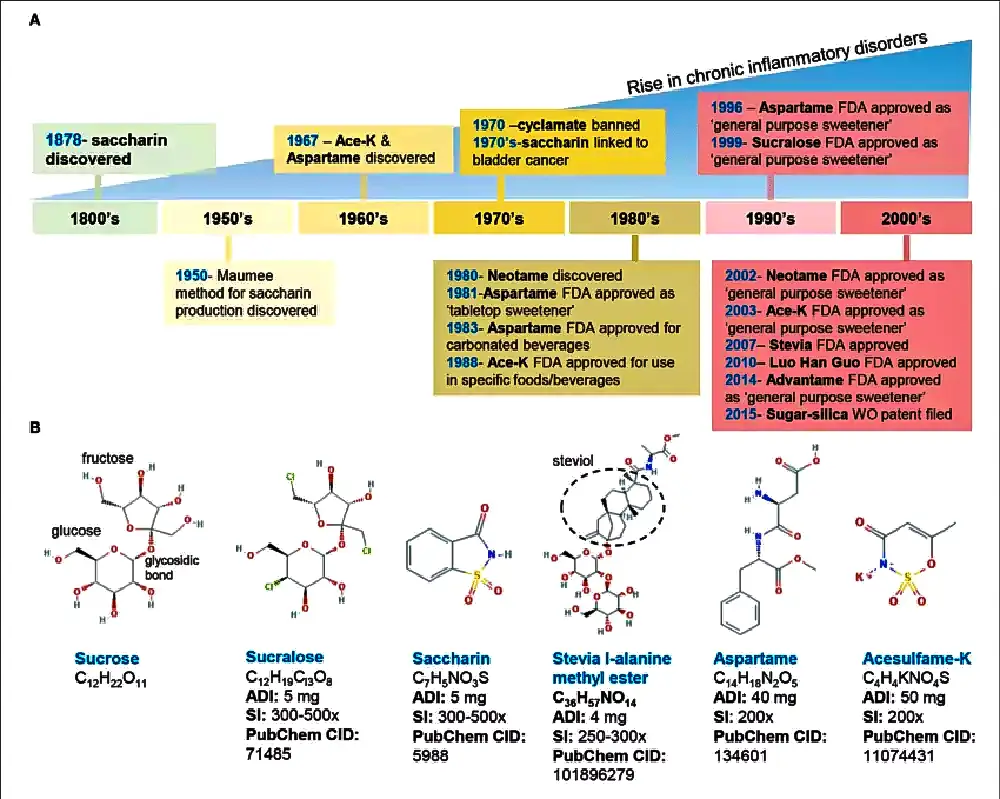
O Acesulfame-K vendido como um doce está ligado a uma dor de cabeça aguda e também a danos no ADN. Está provado que é clastogénico (agente mutagénico) e genotóxico em doses elevadas e tem causado tumores da tiróide em ratos.
O ciclamato vendido como gémeo de açúcar foi proibido há mais de 40 anos devido à ligação entre o cancro da bexiga em ratos e a atrofia testicular em ratos. Ainda é legal no Canadá e em muitos outros países.
A sacarina, descoberta por acidente enquanto se experimenta com derivados de alcatrão de carvão está ligada a náuseas, vómitos, diarreia, cancro nos descendentes de animais amamentados, baixo peso à nascença, cancro da bexiga nas pessoas, e hepatotoxicidade.
A sucralose, descoberta acidentalmente durante uma experiência no Queen's College, em Londres, quando se tentava formular um novo pesticida (por exemplo, Splenda), está associada a diarreia, encolhimento do timo e aumento do tamanho do ceco em ratos. É um forte desencadeador de enxaquecas.
Álcoois de açúcar como sorbitol e xilitol, ao contrário do eritritol, não são absorvidos, por isso fermentam no cólon e atraem líquido para dentro dele e podem ter um efeito laxante.
Ok, mas ainda há pessoas que querem provar algo doce mas têm diabetes, e para elas, normalmente, os substitutos do açúcar são um must na dieta.
Até que alguns novos estudos foram feitos, a crença comum recentemente era que os edulcorantes substitutos não nutritivos eram substitutos saudáveis do açúcar, porque fornecem um sabor doce sem calorias ou efeitos glicémicos, para que possam ser extremamente benéficos para as pessoas que têm diabetes. Contudo, os resultados de algumas investigações epidemiológicas descobriram que o consumo de alimentos artificialmente adoçados, principalmente em refrigerantes dietéticos, está associado a um risco acrescido de desenvolver obesidade, síndrome metabólica e, mais importante ainda, diabetes tipo 2.
O problema é que se considerava que eram apenas substâncias químicas "metabolicamente inactivas" no intestino e que saíam verdadeiramente do sistema digestivo sem promover a desregulação metabólica.
Já mencionei que os alimentos artificialmente adoçados interferem com as respostas aprendidas que contribuem para os desejos de açúcar e controlo do apetite, mas também há mais uma coisa importante para todos, mas especialmente para as pessoas com diabetes que mais os utilizam.
Os edulcorantes artificiais têm efeitos metabólicos.
No presente estudo, por exemplo (Pepino et al., 2013) quando dão a indivíduos obesos a quantidade de sucralose encontrada numa lata de coca-cola zero, estes obtêm picos de açúcar no sangue significativamente mais elevados em resposta a um desafio de glucose. Quanto? Vinte por cento mais níveis de insulina no sangue mostram que a sucralose causa resistência à insulina. E não é só a sucralose. Neste estudo (Suez et al., 2014), testaram a sacarina (Sweet'N Low), o aspartame (Equal e NutraSweet) e a sucralose (Splenda) e descobriram que todos eles induzem a intolerância à glucose ao perturbarem o microbioma.
Eles alteram micróbios que vivem no nosso instinto.
Se ingerirmos adoçantes artificiais, estes alteram as bactérias que crescem no nosso intestino porque são difíceis de absorver, pelo que permanecem no intestino grosso e fermentam. O acessulfame-K também foi testado e correlacionado com alterações nas bactérias intestinais. Isto é importante não só para as pessoas com diabetes, mas também para outras doenças que estão relacionadas com o sistema digestivo, como as doenças inflamatórias intestinais, como a colite ulcerosa e a doença de Crohn. Por exemplo, o ciclamato não foi metabolizado quando injetado pela primeira vez, e as bactérias intestinais não sabem o que fazer com ele. No entanto, ao fim de dez dias, 75% do ciclamato é metabolizado pelas bactérias intestinais em ciclohexilamina e, se deixarmos de o ingerir, as bactérias que o metabolizam voltam a morrer. A ciclohexilamina é muito tóxica, e a FDA proibiu-a em 1969, mas não no Canadá e em muitos outros países.
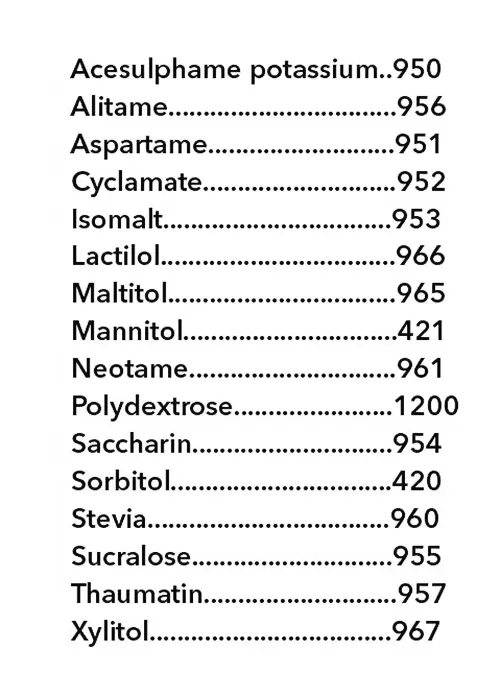
Então existe algum adoçante artificial que seja seguro?
Pensa-se que Stevia não é assim tão má porque inicialmente houve algumas pesquisas que mostraram que é totalmente inofensiva. Mais tarde descobriu-se que pode afectar o microbioma nas entranhas dos ratos. Fermenta-se numa substância chamada steviol que é mutagénica e causa danos no ADN. Os seres humanos têm as mesmas bactérias intestinais que fermentam o stevia. Quando comemos stevia, o steviol mutagénico é criado e absorvido na nossa corrente sanguínea.
A OMS considera 4mg por kg de peso corporal de stevia seguro para que se possa escapar com um item alimentar stevia-doce por dia.
Até agora, o único edulcorante artificial não tóxico pode ser o Erythritol.
Encontra-se naturalmente nas uvas, peras e melões, mas a levedura é utilizada na indústria para a sua produção. Como existe na natureza, temos de presumir que a comemos há milhões de anos, pelo que podemos ter alguma tolerância para com ela. É absorvido no intestino sem fermentação e não tem um efeito laxante. Parece que não interage com nada ou tem qualquer metabolismo na corrente sanguínea e é excretado inalterado na urina. Não se correlaciona com nenhuma doença, e pode até ser útil. Pode até ser na realidade um antioxidante que é ao mesmo tempo doce (den Hartog et al., 2010). O eritritol demonstrou ser um excelente eliminador de radicais livres (antioxidante) in vivo e pode ajudar a proteger contra os danos vasculares induzidos pela hiperglicemia (diabetes).
Para ser seguro se tiver diabetes e usar edulcorantes artificiais, use Erythritol.
Até agora, a ciência mostra que esta é a melhor opção. No estudo citado, foi demonstrado que o Erythritol protege a destruição oxidativa dos glóbulos vermelhos do agente. O eritritol quimicamente na estrutura parece muito semelhante ao manitol, um conhecido antioxidante. O problema com o manitol e outros edulcorantes derivados do álcool como o sorbitol ou xilitol é que não são absorvidos, ao contrário do eritritol.
Os únicos outros edulcorantes que são doces e têm propriedades antioxidantes ao mesmo tempo são os frutos.
A melhor prática a adoptar é que, se tiver um desejo de açúcar, basta comer a fruta inteira.
São adoçantes, mas ao mesmo tempo são nutritivos e saudáveis. Actualmente, vivemos numa sociedade globalizada em que a maioria de nós pode encontrar fruta fresca ou fruta congelada durante todo o ano. E também podemos utilizar frutos secos. É uma preferência de gosto. Nalguns casos em que isso não pode ser feito, por exemplo, se quiser adoçar o seu café, use eritritol.
O açúcar tâmara é o adoçante mais saudável actualmente e não é realmente açúcar, mas tâmaras secas inteiras pulverizadas em pó.
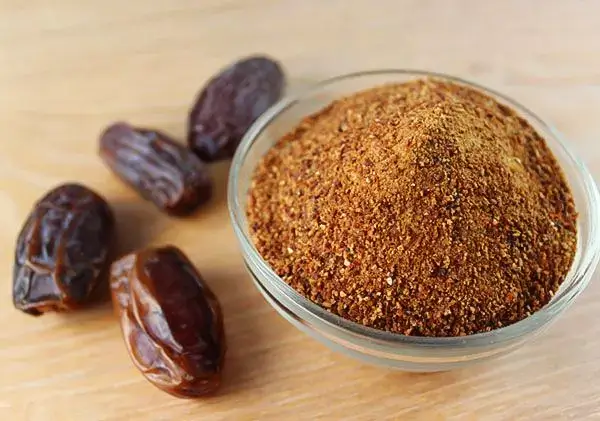
As tâmaras têm, em peso, 80% de açúcar, mas não estão relacionadas com efeitos negativos no aumento de peso e no controlo do açúcar no sangue e, na verdade, melhoram os níveis de stress antioxidante e a Hallawi é melhor do que a Medjool (Rock et al., 2009).
Porque as tâmaras ou outros frutos secos ou fruta natural contêm fibras, tem um efeito espessante. Se não for possível utilizar açúcar tâmara ou outro tipo de frutos secos para alguma receita e precisar de açúcar refinado, então utilizar xarope de malte de cevada ou melaço. O melaço está em segundo lugar.

Para compreender porque recomendo açúcar refinado com baixo teor de frutose, como xarope de cevada em vez de açúcar branco ou mel, pode ler um artigo relacionado (Açúcar Refinado Risco Para a Saúde Correlações- Compreender as Noções Básicas). Se não quiser engrossar o café ou o chá, por exemplo, então o Erythritol pode ser uma escolha.
Referências:
- Mattes R. (1990). Efeitos do aspartame e da sacarose sobre a fome e a ingestão de energia em humanos. Fisiologia e comportamento, 47(6), 1037-1044. https://doi.org/10.1016/0031-9384(90)90350-d
- Pepino, M. Y., Tiemann, C. D., Patterson, B. W., Wice, B. M., & Klein, S. (2013). A sucralose afeta as respostas glicêmicas e hormonais a uma carga oral de glicose. Cuidados com a diabetes, 36(9), 2530-2535. https://doi.org/10.2337/dc12-2221
- Suez, J., Korem, T., Zeevi, D., Zilberman-Schapira, G., Thaiss, C. A., Maza, O., Israeli, D., Zmora, N., Gilad, S., Weinberger, A., Kuperman, Y., Harmelin, A., Kolodkin-Gal, I., Shapiro, H., Halpern, Z., Segal, E., & Elinav, E. (2014). Os adoçantes artificiais induzem a intolerância à glicose, alterando a microbiota intestinal. Natureza, 514(7521), 181-186. https://doi.org/10.1038/nature13793
- den Hartog, G. J., Boots, A. W., Adam-Perrot, A., Brouns, F., Verkooijen, I. W., Weseler, A. R., Haenen, G. R., & Bast, A. (2010). O eritritol é um antioxidante doce. Nutrição (Burbank, Los Angeles County, Califórnia)., 26(4), 449-458. https://doi.org/10.1016/j.nut.2009.05.004
- Rock, W., Rosenblat, M., Borochov-Neori, H., Volkova, N., Judeinstein, S., Elias, M., & Aviram, M. (2009). Efeitos do consumo de tâmaras (Phoenix dactylifera L., Medjool ou Hallawi Variety) por indivíduos saudáveis nos níveis séricos de glicose e lípidos e no estado oxidativo do soro: um estudo piloto. Revista de química agrícola e alimentar, 57(17), 8010-8017. https://doi.org/10.1021/jf901559a
Publicações Relacionadas
Você tem alguma dúvida sobre saúde e nutrição?
Eu adoraria ouvir de você e respondê-las em meu próximo post. Agradeço sua contribuição e opinião e espero ouvir de você em breve. Eu também convido você a siga-nos no Facebook, Instagram e Pinterest para mais conteúdos sobre dieta, nutrição e saúde. Pode deixar um comentário e ligar-se a outros entusiastas da saúde, partilhar as suas dicas e experiências e obter apoio e encorajamento da nossa equipa e comunidade.
Espero que este post tenha sido informativo e agradável para si e que esteja preparado para aplicar os conhecimentos que aprendeu. Se achou este post útil, por favor partilhá-lo com os seus amigos e familiares que também possam beneficiar com isso. Nunca se sabe quem poderá precisar de alguma orientação e apoio no seu percurso de saúde.
– Você Também Pode Gostar –

Aprender Sobre Nutrição
Milos Pokimica é médico de medicina natural, nutricionista clínico, escritor de saúde e nutrição médica, e conselheiro em ciências nutricionais. Autor da série de livros Go Vegan? Revisão de Ciênciaopera também o website de saúde natural GoVeganWay.com
Medical Disclaimer
GoVeganWay.com traz análises das pesquisas mais recentes sobre nutrição e saúde. As informações fornecidas representam a opinião pessoal do autor e não pretendem nem implicam substituir aconselhamento, diagnóstico ou tratamento médico profissional. As informações fornecidas são apenas para fins informativos e não se destinam a servir como substituto para consulta, diagnóstico e/ou tratamento médico de um médico ou profissional de saúde qualificado.NUNCA DESCONSIDERE o CONSELHO MÉDICO PROFISSIONAL OU adiar a BUSCA de TRATAMENTO MÉDICO por causa DE ALGO QUE TENHA LIDO OU ACESSADO por MEIO de GoVeganWay.com
NUNCA APLIQUE QUAISQUER MUDANÇAS de estilo de VIDA OU QUALQUER MUDANÇA COMO UMA CONSEQUÊNCIA DE ALGO QUE TENHA LIDO NO GoVeganWay.com ANTES de CONSULTORIA de LICENÇA MÉDICA.
No caso de uma emergência médica, ligue para o médico ou para o 911 imediatamente. GoVeganWay.com não recomenda ou endossa qualquer específicos, grupos, organizações, exames, médicos, produtos, procedimentos, opiniões ou outras informações que podem ser mencionadas dentro.
Sugestões do Editor –
Milos Pokimica é escritor especializado em saúde e nutrição e consultor em ciências nutricionais. Autor da série de livros Go Vegan? Revisão de Ciênciaopera também o website de saúde natural GoVeganWay.com
Artigos Mais Recentes -
Superior De Saúde De Notícias — ScienceDaily
- This brain discovery is forcing scientists to rethink how memory workson Fevereiro 3, 2026
A new brain imaging study reveals that remembering facts and recalling life events activate nearly identical brain networks. Researchers expected clear differences but instead found strong overlap across memory types. The finding challenges decades of memory research. It may also help scientists better understand conditions like Alzheimer’s and dementia.
- Scientists discover protein that could heal leaky gut and ease depressionon Fevereiro 2, 2026
Chronic stress can damage the gut’s protective lining, triggering inflammation that may worsen depression. New research shows that stress lowers levels of a protein called Reelin, which plays a key role in both gut repair and brain health. Remarkably, a single injection restored Reelin levels and produced antidepressant-like effects in preclinical models. The findings hint at a future treatment that targets depression through the gut–brain connection.
- Scientists Warn: This “miracle cure” works only by damaging human cellson Fevereiro 2, 2026
MMS has long been promoted as a miracle cure, but new research shows it’s essentially a toxic disinfectant. While it can kill bacteria, it only works at levels that also damage human cells and beneficial gut microbes. Scientists warn that homemade MMS mixtures are especially dangerous due to wildly inconsistent dosing. The study calls MMS a clear case where the risks are high—and the benefits are effectively zero.
- A silent brain disease can quadruple dementia riskon Fevereiro 2, 2026
Researchers studying nearly 2 million older adults found that cerebral amyloid angiopathy sharply raises the risk of developing dementia. Within five years, people with the condition were far more likely to be diagnosed than those without it. The increased risk was present even without a history of stroke. Experts say this makes early screening for memory and thinking changes especially important.
- Alzheimer’s scrambles memories while the brain restson Fevereiro 1, 2026
When the brain rests, it usually replays recent experiences to strengthen memory. Scientists found that in Alzheimer’s-like mice, this replay still occurs — but the signals are jumbled and poorly coordinated. As a result, memory-supporting brain cells lose their stability, and the animals struggle to remember where they’ve been.
- Middle age is becoming a breaking point in the U.S.on Fevereiro 1, 2026
Middle age is becoming a tougher chapter for many Americans, especially those born in the 1960s and early 1970s. Compared with earlier generations, they report more loneliness and depression, along with weaker physical strength and declining memory. These troubling trends stand out internationally, as similar declines are largely absent in other wealthy nations, particularly in Nordic Europe, where midlife well-being has improved.
- “Existential risk” – Why scientists are racing to define consciousnesson Fevereiro 1, 2026
Scientists warn that rapid advances in AI and neurotechnology are outpacing our understanding of consciousness, creating serious ethical risks. New research argues that developing scientific tests for awareness could transform medicine, animal welfare, law, and AI development. But identifying consciousness in machines, brain organoids, or patients could also force society to rethink responsibility, rights, and moral boundaries. The question of what it means to be conscious has never been more […]
PubMed, #vegan-dieta –
- Diet type and the oral microbiomeon Fevereiro 2, 2026
CONCLUSION: The diet-oral microbiome-systemic inflammation axis is bidirectional and clinically relevant. Understanding both direct ecological regulation and indirect metabolic effects is essential to support precision nutrition strategies aimed at maintaining oral microbial balance and systemic inflammatory risk mitigation.
- Consensus document on healthy lifestyleson Janeiro 22, 2026
Proteins are a group of macronutrients that are vital to our lives, as they perform various functions, including structural, defensive and catalytic. An intake of 1.0-1.2 g/kg/body weight per day would be sufficient to meet our needs. Carbohydrate requirements constitute 50 % of the total caloric value and should be obtained mainly in the form of complex carbohydrates. In addition, a daily intake of both soluble and insoluble fiber is necessary. Regular consumption of extra virgin olive oil […]
- Vitamin B12 and D status in long-term vegetarians: Impact of diet duration and subtypes in Beijing, Chinaon Janeiro 21, 2026
CONCLUSIONS: This study reveals a dual challenge among Beijing long-term vegetarians: vitamin B12 deficiency was strongly associated with the degree of exclusion of animal products from the diet (veganism), while vitamin D deficiency was highly prevalent and worsened with longer diet duration. The near-universal vitamin D deficiency observed in this study suggests that, in the Beijing context, the risk may extend beyond dietary choice, potentially reflecting regional environmental factors;…
- Nutritional evaluation of duty meals provided to riot police forces in Germanyon Janeiro 13, 2026
Background: The primary role of the German riot police is maintaining internal security. Due to challenging working conditions, riot police forces face an elevated risk of various diseases. During duty, forces are provided with meals. A balanced diet can reduce the risk of some of these diseases and contribute to health-promoting working conditions. Aim: First evaluation of the nutritional quality of duty meals in Germany based on German Nutrition Society recommendations (DGE). Methods: In…
- Iodineon Janeiro 1, 2006
Iodine is an essential trace nutrient for all infants that is a normal component of breastmilk. Infant requirements are estimated to be 15 mcg/kg daily in full-term infants and 30 mcg/kg daily in preterm infants.[1] Breastmilk iodine concentration correlates well with maternal urinary iodine concentration and may be a useful index of iodine sufficiency in infants under 2 years of age, but there is no clear agreement on a value that indicates iodine sufficiency, and may not correlate with […]
Postagens aleatórias –
Postagens em destaque –
Últimas do PubMed, #dieta baseada em vegetais –
- Molecular Characterization of Tobacco Necrosis Virus A Variants Identified in Sugarbeet Rootspor Alyssa Flobinus on Fevereiro 3, 2026
Sugarbeet provides an important source of sucrose; a stable, environmentally safe, and low-cost staple in the human diet. Viral diseases arising in sugarbeet ultimately impact sugar content, which translates to financial losses for growers. To manage diseases and prevent such losses from occurring, it is essential to characterize viruses responsible for disease. Recently, our laboratory identified a tobacco necrosis virus A variant named Beta vulgaris alphanecrovirus 1 (BvANV-1) in sugarbeet…
- Effect of the gut microbiota on insect reproduction: mechanisms and biotechnological prospectspor Dilawar Abbas on Fevereiro 2, 2026
The insect gut microbiota functions as a multifunctional symbiotic system that plays a central role in host reproduction. Through the production of bioactive metabolites, gut microbes interact with host hormonal pathways, immune signaling, and molecular regulatory networks, thereby shaping reproductive physiology and fitness. This review summarizes recent advances in understanding how gut microbiota regulate insect reproduction. Accumulating evidence demonstrates that microbial metabolites…
- Rationale and design of a parallel randomised trial of a plant-based intensive lifestyle intervention for diabetes remission: The REmission of diabetes using a PlAnt-based weight loss InteRvention…por Brighid McKay on Fevereiro 2, 2026
CONCLUSIONS: This trial will provide high-quality clinical evidence on the use of plant-based ILIs to address the epidemics of obesity and diabetes to inform public health policies and programs in Canada and beyond.
- Diet type and the oral microbiomepor Daniel Betancur on Fevereiro 2, 2026
CONCLUSION: The diet-oral microbiome-systemic inflammation axis is bidirectional and clinically relevant. Understanding both direct ecological regulation and indirect metabolic effects is essential to support precision nutrition strategies aimed at maintaining oral microbial balance and systemic inflammatory risk mitigation.
- The Potential of Plant-Based Lifestyle Interventions to Reduce the Burden of Disease in a Multi-Crisis Erapor Komathi Kolandai on Fevereiro 2, 2026
This transdisciplinary, evidence-based viewpoint draws attention to literature suggesting that formalized plant-based lifestyle interventions have the potential to reduce the risk of COVID-19 and non-communicable diseases. Such interventions also offer the health sector a way to contribute to mitigating the risk of new zoonotic diseases and reducing carbon emissions (and, consequently, climate-change-induced diseases), all of which would help lower the overall disease burden. However, several…
- Association between Mediterranean Diet and Development of Multiple Sclerosis: A Systematic Review and Meta-Analysispor Fatemeh Shakouri on Janeiro 30, 2026
BACKGROUND: Multiple sclerosis (MS) is a chronic inflammatory demyelinating disease of the central nervous system. Given the conflicting evidence regarding the impact of adherence to the Mediterranean diet (MedDiet) on MS development and the lack of a systematic review on this topic, this study aimed to examine this association.
